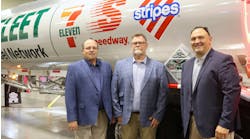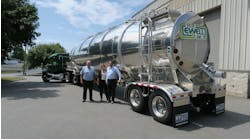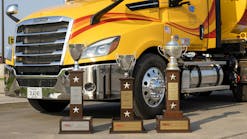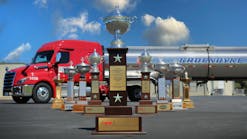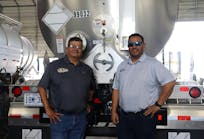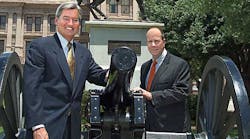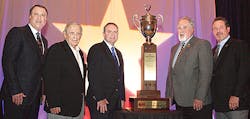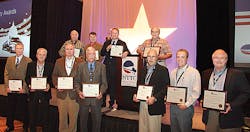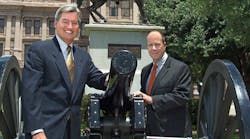Latest from Features
BOOMING oil and gas shale activity helped draw National Tank Truck Carriers members to Austin, Texas, for the association’s 65th Annual Conference & Tank Truck Equipment Show. Oilfield activity is one reason the tank truck sector continues to outperform much of the trucking industry as a whole.
Hans Schaupp, NTTC’s 2012-2013 chairman and president of LCL Bulk Transport Inc, put it aptly. “It’s no accident that we are in Texas this year given its leadership position among energy producing states,” he said.
During his annual economic report, Bob Costello, chief economist and vice-president of the American Trucking Associations, said the oilfield is one of the big reasons that tank truck loads are projected to grow by around 4.5% in 2013.
During the first quarter of 2013, tank truck loads grew 6.8% over the previous year. Only truckload intermodal did better at 7.5% during the same period. Dry van loads actually dropped 3.5%.
“Liquid and dry bulk cargo is being generated by a variety of sources,” Costello said. “The housing recovery is real; factory output is climbing; and the energy production boom is here to stay. The United States now has the very real opportunity to achieve energy independence.”
John Felmy, chief economist for the American Petroleum Institute, said the boom in oil and gas production will continue and tank truck fleets will be a big part of it. “We’ve had the biggest increase in US oil and gas production in the history of the industry in terms of volumes,” he said. “That’s what is really exciting. We desperately need all the services you provide hauling the inputs or the outputs. It’s a wonderful opportunity going forward.”
Key points of his presentation:
• More than $2.1 trillion in capital expenditures will take place in unconventional oil activity and $3 trillion in unconventional natural gas activity.
• Upstream unconventional oil and natural gas activity will support more than 1.7 million jobs in 2012, growing to some 2.5 million jobs in 2015, 3 million jobs in 2020, and 3.5 million jobs in 2035.
• On average, direct employment will represent about 20% of all jobs resulting from unconventional oil and natural gas activity with the balance contributed by indirect and induced employment.
• In 2012, unconventional oil and natural gas activity contributed nearly $62 billion in federal, state, and local tax receipts. By 2020, total government revenues will grow to just over $111 billion. On a cumulative basis, unconventional oil and natural gas activity will generate more than $2.5 trillion in tax revenues between 2012 and 2035.
With the oilfield running at full speed, concerns have been raised about the safety of the trucking companies serving the exploration and production operators. Those fleets are getting more scrutiny from the enforcement community, but they are not alone, according to Anne Ferro, administrator of the Federal Motor Carrier Safety Administration (FMCSA).
She said her agency continues to work aggressively to reduce the heavy-duty truck accident rate across the entire trucking industry. “Since 2005, the rate of fatalities in crashes involving trucks and buses has been reduced by 28%,” she said. “It didn’t come down by accident, but we still have almost 10 people dying each day in crashes involving a bus or truck. Are they all the truck industry’s fault? No, but what can we all do to influence placement, timing, and outcome to eliminate those accidents? The good news is that you have had an impact already—a positive one from which we need to continue momentum.”
Strengthening safety standards
Ferro said FMCSA is working hard to shut down the bad operators and make sure they can’t reenter the industry. The agency continues to strengthen the safety standards for truck fleets and drivers.
“We have developed a more advanced set of investigative techniques,” she said. “We are very focused on chameleon new carriers putting everybody at risk—yourselves from a competitive perspective and all of us from a safety perspective.
“We have absolutely no tolerance. I have zero tolerance for companies that have no business being on the roadway and drivers who have no business being behind the wheel, and I will continue to do everything I can to get all of you the tools you need to keep unsafe drivers from getting behind the wheel.”
While safety is critical for the trucking industry, highway funding is every bit as important, according to Warren Hoemann, senior vice-president industry affairs of American Trucking Associations. He said MAP-21, the Moving Ahead for Progress in the 21st Century Act, is a move in the right direction, both for trucking safety and highway funding. It’s just a start, though.
MAP-21 provided funding for surface transportation programs at more than $105 billion, but it just applies to fiscal years 2013 and 2014. “It doesn’t get us very far in terms of highway funding, and we have major issues in front of us,” he said. “We had an influx of about $50 billion out of the general fund. But we have not had an increase in federal highway taxes in a long time. So we’re coming up quickly on 2015, when the highway trust fund won’t have any money. We have to find a way of getting money into the highway fund. Our choice and NTTC’s first choice is an increase in the federal fuel tax.”
Through MAP-21, Congress also is overseeing FMCSA’s Compliance, Safety, Accountability (CSA) program. “We’ve encouraged Congress to help look for ways to make the program better,” Hoemann said. “We believe improvements still should be made. Let’s be sure that crash accountability is taken care of. Let’s remove from the record of trucking companies those crashes which were clearly unavoidable.’ If we look at head-on collisions, the vast majority between cars and trucks have occurred when a car has crossed a median—sometimes even a divider—and crashed into a truck. There always will be close calls on issues, but let’s take the clear ones and get them off the table. We also said to Congress, ‘Let’s be sure when FMCSA comes out with a safety fitness ruling, which is still scheduled later this year, that the measurements they put up to say your company is safe or not really ties back to crashes.’ We have found that a couple of BASICS in CSA have no statistical correlation to crashes, so let’s be sure we’re telling the right message when we put up a safety score for a carrier.”
Natural gas power
Attendees heard the latest on natural gas power from Jim Harger, chief marketing officer for Clean Energy Fuels. He detailed “The Business Case” for using natural gas in heavy-duty trucks during his presentation.
“You can be a solution provider to your clients,” he said. “Many of the shippers you work for are looking for ways to meet sustainability objectives. You can provide them with at least a 25% reduction in carbon compared to running a diesel truck. And if you use biomethane from one of our landfills, you can get down to a 90% reduction by using 100% biomethane.
“A lot of tank fleets haul fuel for refiners. Refiners have to buy low-carbon footprints, not just in California, but nationwide. This truck you run on natural gas could mean an annuity, and those carbon credits could be sold back to your customers. It’s a way for you to gain additional business and further reduce capital payback.”
Drivers got a lot of attention during this year’s annual conference. NTTC launched the new William A Usher Sr Award to recognize excellence within the professional tank-truck driver community.
NTTC Vice-Chairman Dean Kaplan proposed the new program based on his company’s valuable experience with similar programs on the state and national levels. The award will honor professional tank-truck drivers and independent contractors who serve the industry with the most reliable and safe transportation of liquid and dry-bulk commodities. It is named after William A Usher Sr from Usher Transport Inc because of his extensive career in and service to the tank-truck industry. NTTC member Baldwin & Lyons Inc is the official sponsor of the award.
Eight finalists will be selected in the spring of 2014 and one champion driver will be named at the NTTC’s 66th Annual Conference in Las Vegas, Nevada. This top tank truck driver will be selected for his or her abilities to operate safely and professionally, demonstrated leadership abilities within his or her own company, and the candidate’s contributions to the industry and community.
ATA America's Road Team
The latest tank truck carrier sector representatives on ATA’s America’s Road Team were applauded for their achievement and professionalism. Dale Williams, Trimac Transportation South, and Todd Stine, Carbon Express Inc, were among 19 professional truck drivers named to the team by the American Trucking Associations (ATA) in January. The premier group of professional truck drivers, all with millions of accident-free truck driving miles, will spend the next two years representing the trucking industry and delivering its highway safety message to the motoring public.
“This industry is a proud industry,” Williams said. “Pulling a tank is a tough, dedicated job. It takes a special driver with skills unique in driving, an ability to understand the stability of a product in the tank, and the passion to do it. Not everybody is designed to pull a tank.
“If I had to say something to a new driver, it would be: Make sure this is what you want to do and then rely on everything you know about what you’re doing to prevent anything from going wrong. The rewards are tremendous. What we do is a proud profession.”
Stine said he decided to get into truck driving after graduating from college and spending five years as a draftsman. “There’s an old saying I heard on the CB radio long before I became a tanker driver: ‘Once a tanker-yanker, always a tanker-yanker,’” he said. “That spiked my interest. After 10 years of flatbedding and doing dirty, sweaty work, I decided to try something different and gave tank-truck driving a chance.
Even as NTTC member looked ahead with new programs, including the William A Usher Sr Award, they took time to reflect on John Conley’s 24 years on the association’s staff. He was honored at a special program during the Chairman’s Reception on the first day of the conference.
Conley was hired in 1989 as NTTC vice-president. He took over as president in 2006 following the retirement of Cliff Harvison. Conley was just the third person to direct NTTC’s day-to-day operations. He will serve as past president of NTTC through the end of this year.
James Shaeffer, president and chief executive officer of McKenzie Tank Lines Inc, was elected 2013-2014 chairman. Previously, Shaeffer was Southern Region vice-chairman.
NTTC’s 66th Annual Conference & Tank Truck Equipment Show will be convened in Las Vegas, Nevada. The event will be held April 27-29, 2014 at the Bellagio Las Vegas. ♦
